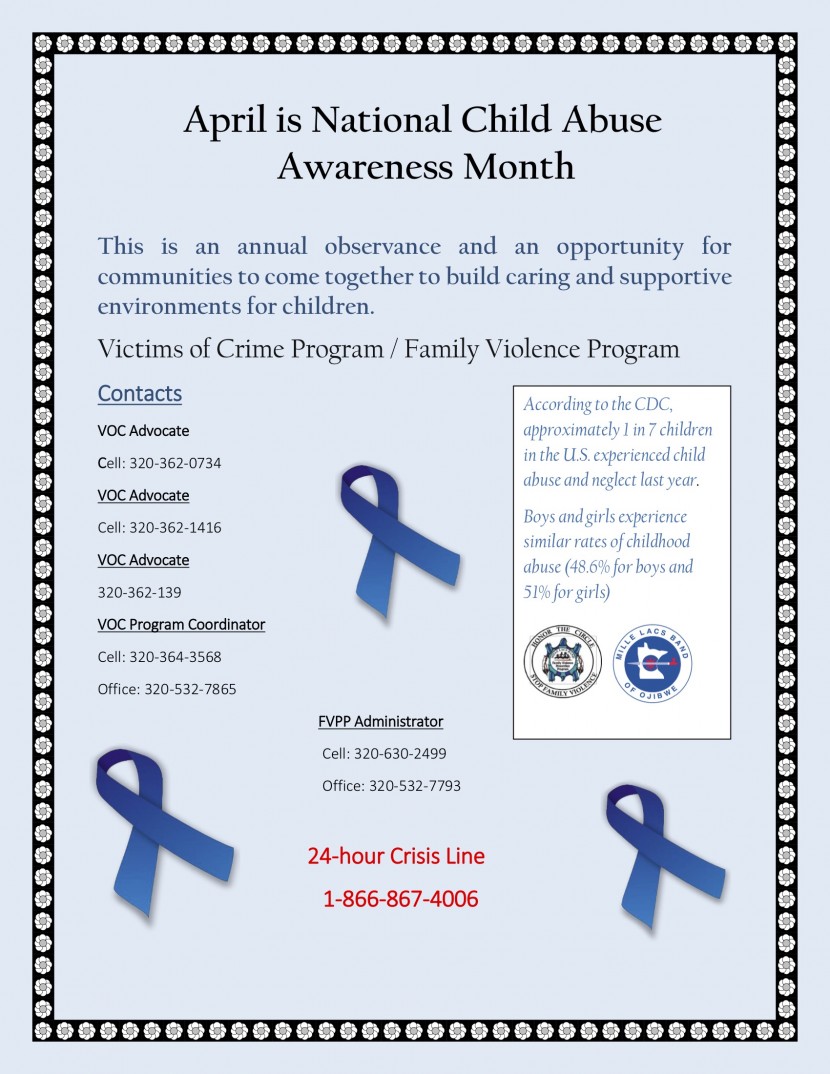
The goal of Child Abuse Prevention Month is to make sure community members are aware of the signs and symptoms of abuse, and that everyone has a responsibility to stand up for children. When child abuse is prevented or stopped, other health problems such as substance abuse, teen pregnancy, STI’s, mental health disorders, and future abuse will not be as prevalent. By involving the entire Band community, lives of children can be changed and improved. By promoting safety and awareness, and standing up for children, abuse can be prevented and children can be safe.
Who should report child abuse?
The answer is simple. Anyone who witnesses abusive behavior towards a child can and should report it. Child abuse is not just a family problem. It’s a social health issue. Child abuse is everyone’s business. Everyone needs to be a child’s advocate and report child abuse and neglect. If you see or hear something suspicious, say something. Speak up. You may save a child from further harm, or you may even save a child’s life.
Child abuse takes many forms. It may include physical, emotional, verbal, sexual, neglect, exploitation, bullying, and more. The shocking truth is that neglect is the number one form of child abuse in America. More children die from neglect every year than from any other form of abuse. If the child is in immediate risk of harm, call 911 or tribal/local law enforcement.
Where To Start?
Contact the Child Help National Child Abuse Hotline at 1-800-4-CHILD or 1-800-422-4453. Text:1-800-422-4453. Live chat: http://www.childhelp.org/childhelp-hotline/. Trained counselors offer advice and information. They have a network of agencies all across the country.
The Band also has individuals on staff who can help those who have questions about child abuse: Victims of Crime Advocate, 320-362-0734, 320-362-1416, 320-362-1398; VOC Program Coordinator (cell) 320-364-3568 or (office) 320-532-7865; Family Violence Prevention Program Administrator (cell) 320-630-2499 or (office) 320-532-7793; Women’s Shelter, 320-495-3514; 24-hour Crisis Line, 1-866-867-4006.
Reporting: A Difficult Thing To Do
Nobody wants to be the person who didn’t report child abuse when they had concerns and later on it comes to light. But nobody wants to get someone who hasn’t done anything wrong in trouble. Calling to report about a relative, friend, or acquaintance can be an extremely hard decision.
What to Watch For
- If you notice bruises, cuts, or other signs of physical injury on a child’s body.
- If you suspect sexual abuse or exploitation.
- If you think a child may be neglected, and their basic needs are not being met.
Why People Hesitate
People might avoid making a call to report because they aren’t certain that abuse has occurred. But all you need is a reasonable suspicion. It’s better to err on the side of a child’s needs than worry about proof. People who are concerned about child abuse don’t have to investigate the situation themselves before reporting. And if there is worry about making people angry, make the call anonymously. If you do choose to give your name, that information is usually not released to the family involved.
Helpful Information to Report
- Child’s name, address or telephone number.
- Child’s age.
- Where abuse took place.
- Where the child is now.
- Details about the alleged abuse or neglect.
Leaving a child home alone
All parents or guardians eventually face the decision to leave a child home alone for the first time. Whether they are just running to the store for a few minutes or working during after-school hours, parents need to be sure their child has the skills and maturity to handle the situation safely. Being trusted to stay home alone can be a positive experience for a child who is well-prepared. It can boost the child’s confidence and promote independence and responsibility.However, children face real risks when left unsupervised. Those risks, as well as the child’s comfort level and ability to deal with challenges, must be considered. In addition to age and maturity, a child will need to master some specific skills before being able to stay home alone safely. In particular, each child needs to know what to do and whom to contact in an emergency situation. This information should be written out in a way the child can understand and stored where they can find it easily. Make sure that there is easy access to first aid supplies in case they are needed, and knowledge of first aid is useful for a child to have when they are home alone. The Red Cross has created a pediatric first aid reference guide and a safety tip sheet that outlines the steps that adults and children can take to make being home alone safer and less stressful. You can find this information at: https://www.redcross.org/images/MEDIA_reference.pdf.
There is no agreed-upon age when a child can stay home alone safely. Because children mature at different rates, do not base the decision upon age alone. It is important to evaluate the child’s maturity and behavior in the past. The following questions may help: Is your child physically and mentally able to care for him or herself ? Does your child obey rules and make good decisions? How does your child respond to unfamiliar or stressful situations? Does your child feel comfortable or fearful about being home alone?
Information on this page adapted from article, “When Should you Really Call CPS on Another Parent,” by Claire Gillespie, at https://www.sheknows.com/ and the Children’s Bureau website at: https://www.childwelfare.gov/pubs/factsheets/homealone/.